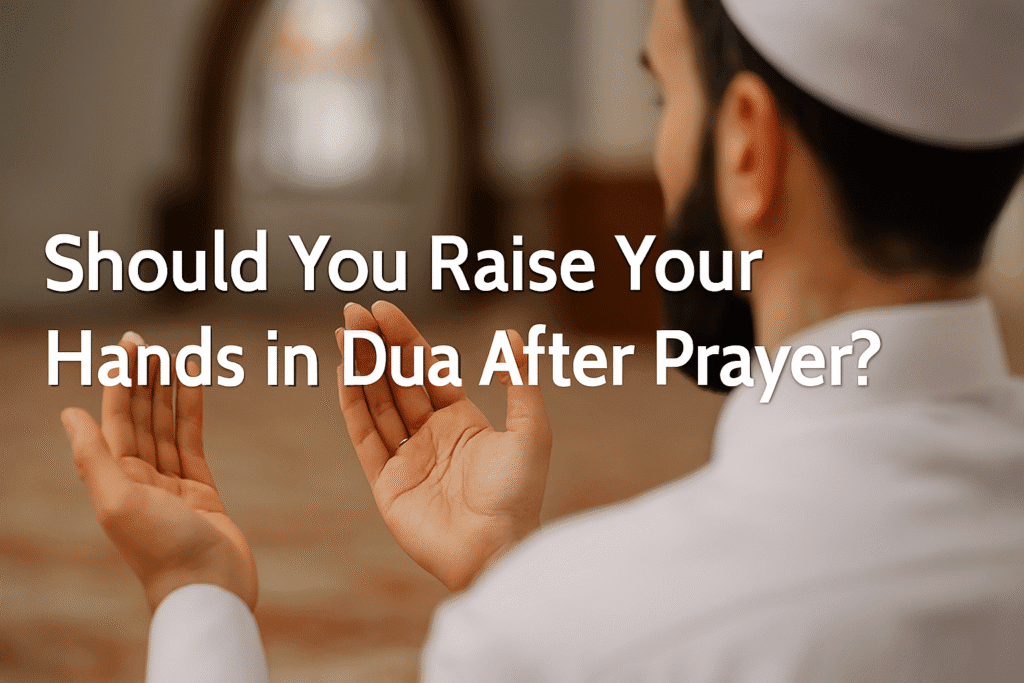The Quiet Question Many Muslims Ask
Every masjid has its own scene. Some finish the salam and quietly leave. Others fold their arms in dhikr. And then there are those who instantly raise their hands in dua, palms open, eyes soft. At some point, you may have wondered is this right, or is it wrong?
The short answer: it is not fard, not a fixed sunnah, but also not a sin. It sits in the wide middle ground of permissible acts. But like all things in Islam, the details matter.
What the Prophet ﷺ Actually Did After Salah
- Astaghfirullah three times — showing humility even after worship (Muslim).
- Ayat al-Kursi — described as a shield and a ticket to Paradise (Nasa’i).
- Tasbih, tahmid, takbir — Subhanallah (33), Alhamdulillah (33), Allahu Akbar (34). Together they make a hundred treasures of dhikr (Bukhari, Muslim).
- Surah al-Ikhlas, al-Falaq, an-Nas — recited especially after Fajr and Maghrib (Tirmidhi).
After this foundation, he ﷺ would sometimes make dua but he did not establish a fixed way of raising his hands after every prayer.
Then Why Do Many Muslims Raise Their Hands
The instinct is simple. You have just stood in front of Allah, your heart softened, your body purified in wudu, your tongue wet with dhikr. This is not just “after salah” it is one of the most hopeful moments for a dua to be answered.
Raising the hands is a sunnah of dua in general. The Prophet ﷺ raised his hands in many moments at Badr, in qunoot, for rain. So Muslims combined the two: after salah, when barakah is fresh, they raise their hands to ask.
The key: it is not prescribed as a must, but it is also not condemned as a sin.
Which Is Better Dua After Salah or Dua Anytime
The Qur’an is wide open: “Call upon Me, I will respond to you” (40:60). Dua on the bus, in your living room, even while lying in bed is accepted.
But dua after a good deed carries a special weight. The Prophet ﷺ told us about the fasting person at iftar, about dua between adhan and iqamah, about sujood, about the last third of the night. By analogy, finishing salah is also a golden moment.
So yes — making dua after salah, when your soul is clean, is generally better than a distracted dua after watching something or wandering the mall.
The Balance to Keep
- Do the adhkar the Prophet ﷺ actually taught first.
- Then if your heart feels the pull, raise your hands and ask.
- Do not treat it as obligatory.
- Do not look down on those who don’t.
A Gentle Recap
Islam is not about bending truth to match our comfort. It is about holding onto truth while making space for the heart. The Prophet ﷺ gave us a strong backbone of adhkar after salah. On top of that, raising the hands in dua is your choice, your moment, your personal doorway to Allah.
So, should you raise your hands in dua after prayer? It is not a must but if it keeps you connected to Allah, then raise them with sincerity. Because in the end, Allah looks at the heart behind the hands.
More Read!
- Asset Progression – What Every Muslim Family Needs to Try for Themselves
- Bukhoor in Singapore The Scent of Heritage and Authenticity


